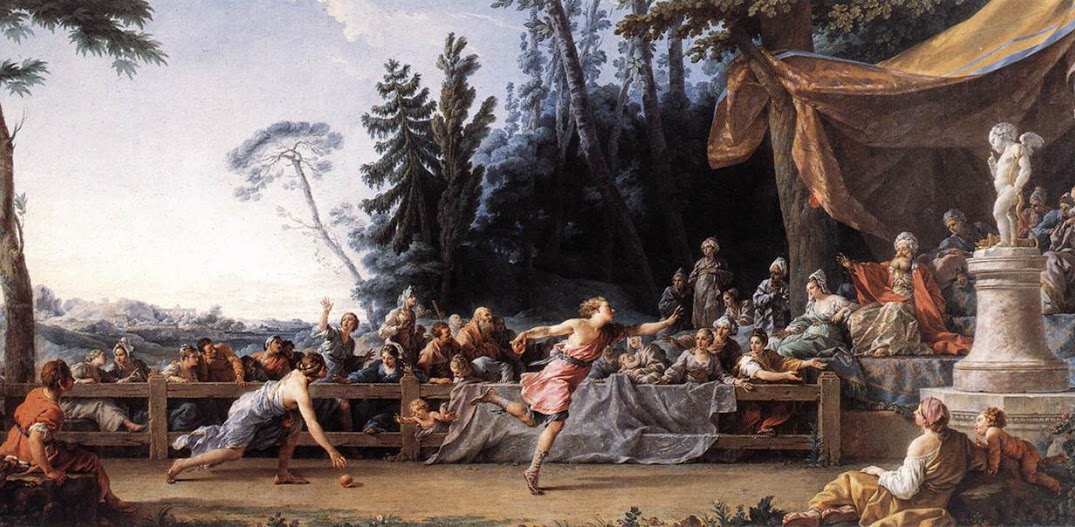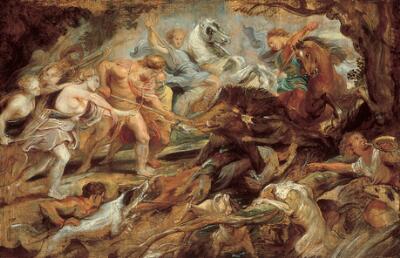Atalanta
The fastest woman in mythology, known for her adventures in the Argonauts expedition and the Calydonian Boar hunt.

In Greek mythology Atalante was beautiful, powerful, and the fastest runner among the mortals. She traveled with Jason and the Argonauts in search of the golden fleece, but is best known for her adventures after the quest, including the hunting of Caledonius Boar, the game with Hippomenes, and for her improper behavior in a temple of Zeus.
The mythical origins of Atalanta are not certain: some stories say she was the daughter of Schineus of Boeotia, others that Iasos of Arcadia was her father. And there are indications that her mother may have been a companion of the goddess Artemis. Whoever her parents were, the legend says she had a traumatic childhood. When Atalanta was born, her father was so disappointed not to have a son that he abandoned the infant in the forest, where she was rescued and nurtured by a bear. Shortly afterwards, hunters found the bear breastfeeding the baby, and took her to raise themselves. Atalanta grew up to become an excellent archer and capable hunter. Some scholars argue that for the ancient Greeks, Atalanta's myth emphasizes the perception of the sons' favor over the daughters.
At the same time, the story of Atalanta, resembles the life of many mythical heroes. For example, Paris, Oedipus and Orestes, all of them were abandoned or rejected when they were young, but the legends say they survived, succeeded, and fulfilled the desires or fears that prompted their parents to abandon them. Atalanta not only became as strong and successful as a son would be to her father, but she also denied her femininity, rejecting the idea of marriage. As far as the chronology is concerned, Atalanti belonged to the generation before the Trojan War, and she participated in two great heroic missions of the fictional era: the quest for the golden fleece, with the Argonauts and the hunting of the Calydonian boar.

After the adventure with the golden fleece, Atalanta played the most important role in the hunting of the Calydonian boar. When Oeneus, the king of Calydon offended Artemis by failing to offer her a sacrifice, the goddess sent a terrible wild boar that ravaged Calydon. The son of Oeneus, Meleager , who was one of the younger Argonauts, called all his ex-comrades, including Atalanta, to help him kill the wild boar. During the hunt, Atalanta first hit the boar with an arrow on his head, taking the first blood. Despite the fact that the wound did not kill the beast, it made it easy for the rest to kill the wild boar, with Meleager giving the deadly blow to the animal.
Meleager awarded the skin of the wild boar to Atalanta. This fact, however, angered the rest of the hunters, especially the uncles of Meleager, Plexippus and Toxeus, because they did not believe that such a honor should be attributed to a woman. In the fierce struggle that followed, Meleager killed his two uncles. That would prove to be fatal to Meleager.
The hero brought a curse at birth by the Moires or Fates- the three women who controlled the destiny. The Moires had appeared to the mother of Meleagrer, Althaia, and predicted that her son would only live as long as the stump that was at that moment in the fireplace was burning. Althaia immediately took the wood out of the fireplace and hid it to protect Meleager. When Althaia heard that her son had killed her siblings, she threw in her woe the fatal stump to the fire, causing the death of Meleager.

According to legend, Atalanta’s success in hunting the Calydonian boar caused reconciliation with her father, Schneneus or Iasus. Like all the fathers of ancient Greece, real or mythical, Schneneus or Iasos had the social responsibility to find a husband for his daughter. However, Atalanta rejected the idea of marriage, probably because there was a bad omen against it by an oracle. The gods rarely tolerate a woman who refuses to marry, so to appease the gods and her father, she agreed to marry under a condition. The man who would be married to would have to beat her first in a race, but if he lost he would have to be killed.
Atalanta, who was the fastest mortal on earth, always won the races, even when she was giving her opponents the lead. The number of dead suitors constantly increased. Finally, Hippomenes (or Melanion), who was in love with beautiful Atalanta, took up the challenge.
Meanwhile, Aphrodite, the goddess of love, was tired of Atalanta's deadly play, and gave Hippomenes three golden apples from the Garden of Hesperides (Hesperides were virgin girls who guarded a magical tree). During the fight, Hippomenes drew Atalanta's attention by throwing each apple just in front of her to make her stop and pick it up. In this way three times Atalanti slowed down just enough, so that Hippomenes could win the race. Atalanta kept her word and married Hippomenes.

The pair matched and loved each other and everything seemed well. Then, one day, Aphrodite, who had been outraged because Hippomenes had failed to thank her for the golden apples, threw a magical spell to the newlyweds, forcing them to make love inside the temple of Zeus. The king of the gods saw the couple in his temple, and as a punishment he transformed Hippomenes into a lion and Atalanta into a lioness. Another story says the couple sinned at the temple of Rhea, the mother of the gods. Then she turned the lovers to lions and made them carry her chariot and serve her forever.